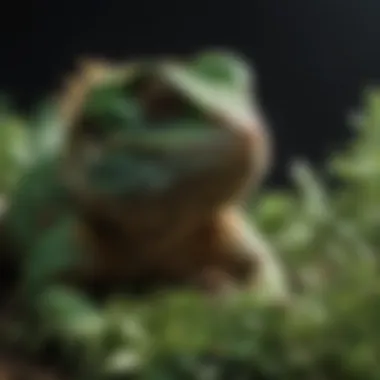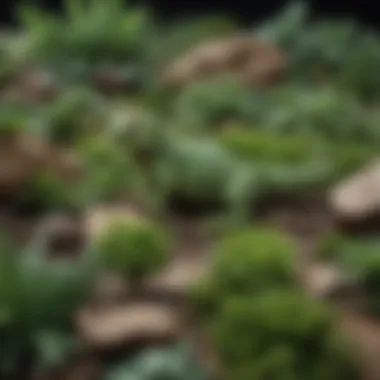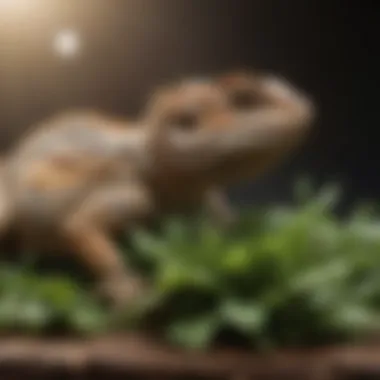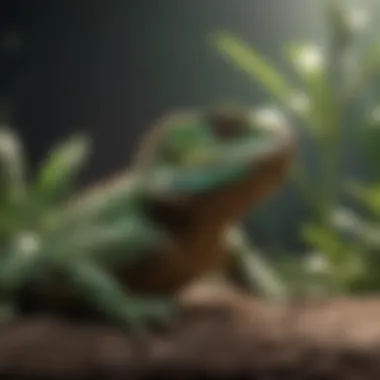Comprehensive Nutritional Guide: Greens for Bearded Dragons


Intro
Bearded dragons are popular pets, appreciated for their interesting personalities and gentle nature. A critical aspect of their care revolves around their diet. In particular, greens play a significant role in providing essential nutrients for these reptiles. This guide explores the nutritional needs of bearded dragons, focusing on the most suitable greens and how they contribute to the overall health of these animals. By understanding the right choices for greens, owners can enhance their pets' well-being effectively.
Pet Care and Grooming
Importance of Regular Care
Taking care of a bearded dragon goes beyond providing food; regular care is essential for its health. Consistent grooming, including checking for signs of mites or skin issues, ensures your pet's comfort and well-being. Owners should familiarize themselves with their pets' specific needs, as bearded dragons can be sensitive to environment changes.
Grooming Techniques by Pet Type
For bearded dragons, specific grooming techniques are important. Routine handling and observation are key. Ensure that their living space is clean, which includes removing uneaten food and waste. Inspect the skin for any abnormalities.
Tools and Products Recommendations
Using the right tools ensures effective care. Recommended items include:
- Soft-bristle brushes for gentle skin cleaning
- Thermometers to monitor habitat temperature
- Reptile-safe cleaning products for habitat maintenance
These tools help maintain an optimal living condition for your bearded dragon.
Seasonal Care Tips
Seasonal changes can affect your pet's behavior and health. During the colder months, monitor temperature levels in the habitat closely. Consider adjusting the lighting duration to mimic natural day and night cycles. In warmer months, ensure proper hydration and ventilation to avoid overheating.
Health and Nutrition
Understanding Pet Nutrition
A solid understanding of pet nutrition is vital for proper bearded dragon care. These reptiles require a balanced diet that includes a range of greens, protein sources, and occasional fruits. Knowing how to balance these components can promote better health outcomes.
Common Health Issues by Species
Bearded dragons can face a range of health issues, such as metabolic bone disease caused by inadequate calcium and UV exposure. Common symptoms include lethargy and difficulty moving. Regular veterinary check-ups can help detect issues early.
Preventive Care and Regular Check-Ups
Pet owners should prioritize preventive care. Schedule regular veterinary exams to monitor your bearded dragon's health. This includes a thorough review of diet and habitat conditions to promote overall well-being.
Food and Dietary Advice
Providing the right dietary advice is crucial. Bearded dragons benefit from leafy greens like collard greens, dandelion greens, and mustard greens. These should be supplemented with protein sources like crickets or mealworms. Avoid feeding high-oxalate greens, such as spinach, as they may block calcium absorption.
Remember to wash all greens thoroughly before feeding to remove any pesticides or harmful residues.
Ending
In summary, a comprehensive understanding of the dietary needs of bearded dragons, especially regarding greens, is crucial for their health. Careful attention to grooming, nutrition, and preventive health can contribute to a longer and healthier life for these reptiles. As the relationship between pets and owners grows, it is essential to prioritize the specific needs of such an intriguing species.
Understanding Bearded Dragon Diet
A bearded dragon's diet is fundamental to its overall health and well-being. Understanding the elements that contribute to a balanced nutrition plan is vital for any owner. This section highlights the significance of a balanced diet and distinguishes between the carnivorous and herbivorous tendencies of these reptiles.
Importance of a Balanced Diet
A balanced diet for bearded dragons provides necessary vitamins, minerals, and protein. Without such a diet, these reptiles can face numerous health issues. The importance of variety in their food can not be overstated. A mix of greens, vegetables, and protein will ensure that the bearded dragon receives the essential nutrients it requires.
Bearded dragons are unique in that their dietary needs change as they age. Young dragons need a higher protein intake. In contrast, adult dragons require more greens and fiber. This shift in nutritional needs must not be overlooked.
Not only does a balanced diet promote better health, but it also enhances the bearded dragon's mood and energy levels. Healthy bearded dragons tend to exhibit more active and curious behaviors, reflecting their well-being.


Carnivorous vs.
Herbivorous Tendencies
While bearded dragons are often classified as omnivores, it is imperative to understand their tendencies toward carnivorous and herbivorous diets. Baby bearded dragons primarily consume insects and proteins. They thrive on a diet rich in meat to support their rapid growth and development. Examples include crickets, mealworms, and larvae.
As they mature, their dietary needs shift significantly. Adult bearded dragons require a higher intake of plants. Vegetables and greens become more predominant in their meals, making their herbivorous tendencies more apparent.
This transition in dietary habits signifies an important aspect of their care. Owners must be aware of this evolution and adjust feeding strategies accordingly. Not accommodating these changes can lead to nutritional deficiencies and health problems.
Understanding the diet of bearded dragons fosters a comprehensive approach to their care. By providing the right balance of greens and proteins, owners can ensure their pets thrive and enjoy a long, healthy life.
Remember: A well-planned diet reflects in the vigor and health of your bearded dragon.
Nutritional Needs of Bearded Dragons
Understanding the nutritional needs of bearded dragons is critical for owners who wish to maintain the health of their pets. The right diet ensures optimal growth, energy levels, and overall well-being. Greens play a significant role in this dietary framework. Within this section, we will delve deeper into the essential nutrients and the unique contributions each makes to the life of a bearded dragon.
Essential Nutrients
Vitamins
Vitamins are organic compounds that bearded dragons need for various bodily functions. They help in maintaining healthy skin, bones, and even immune function. Specific vitamins are crucial in replicating the natural environment these reptiles thrive in. For example, Vitamin A is particularly important for vision and reproduction. It enhances the health of the skin, which is essential given the bearded dragon's shedding cycle.
One pivotal aspect of vitamins is their accessibility through the consumption of greens. For instance, dark leafy greens like kale and collard greens are rich in Vitamin A. This makes them a beneficial choice as it encourages healthy eating habits. However, over-supplementing with a single vitamin can lead to toxicity. Therefore, diversity in greens is crucial to ensure a balanced intake without risks of imbalances.
Minerals
Minerals support various physiological functions in bearded dragons. Calcium is often highlighted as a key player. Proper calcium intake prevents metabolic bone disease, a common issue in reptiles. Phosphorus is equally important, but excessive phosphorus compared to calcium can lead to health problems. Greens like dandelion greens provide this ideal calcium-to-phosphorus ratio, promoting bone health and growth.
One must consider the source of minerals, as not all greens offer the same benefits. Some may be high in certain minerals but lacking in others. Thus, mixing greens will better meet the mineral demands of bearded dragons.
Protein
Protein is another vital component of a bearded dragon’s diet. It helps in building and repairing tissues and is essential for growth. Younger bearded dragons particularly require higher protein levels compared to adults. In the wild, a high percentage of protein in their diet usually comes from insects.
However, greens can complement protein intake. While not as high in protein as animal sources, certain greens like edamame and peas provide necessary protein levels. Adjusting the amount of greens according to the age and activity level of the bearded dragon ensures optimal growth and energy levels.
Role of Greens in the Diet
Greens serve multiple roles in the overall diet of bearded dragons. They provide hydration, fiber, and are a source of energy that is crucial for daily activities. Moreover, they offer both physical and mental stimulation during feeding time as pets interact with various textures and tastes.
The systematic integration of greens into the bearded dragon’s diet nurtures a more vibrant life and minimizes health risks long-term. Potential pitfalls of overlooking greens can lead to serious health implications, emphasizing their critical role in any well-planned diet for these reptiles.
Suitable Greens for Bearded Dragons
Understanding and providing the right greens for bearded dragons is vital. Greens contribute essential nutrients that support the overall health of these reptiles. They are not just a source of food but also play a role in hydration and digestion. A varied and balanced selection of greens can help prevent health issues caused by nutritional deficiencies. This section explores different types of greens suitable for bearded dragons, highlighting their unique benefits and considerations.
Leafy Greens
Leafy greens form an important part of a bearded dragon's diet. They provide essential vitamins and minerals needed for growth, reproduction, and general health. The most commonly recommended leafy greens include kale, collard greens, and dandelion greens. Each has distinct characteristics that make them beneficial.
Kale
Kale is a highly nutritious leafy green that is often included in the diets of bearded dragons. It is high in vitamins A and C, crucial for the immune system and overall health. Kale has a rough texture, which some dragons may find more stimulating to eat. However, it is important to note that kale contains oxalates, which can bind calcium and reduce its absorption. While kale can be fed to bearded dragons, it should be offered in moderation.
Collard Greens
Collard greens are another excellent option for bearded dragons. They are rich in calcium, which is essential for bone health. These greens have a softer texture compared to kale, making them easier for dragons to consume. Collard greens also contain various vitamins and minerals that promote overall well-being. Unlike kale, collard greens are low in oxalate levels, making them a safer choice for regular feeding.
Dandelion Greens
Dandelion greens are highly nutritious and widely recognized as a beneficial food for bearded dragons. They are packed with vitamins A, C, and K, as well as important minerals. Dandelion greens can be found in many environments, making them a cost-effective option for pet owners. Unlike some other greens, dandelion greens are very low in oxalates, making them a great staple in their diet. However, it is crucial to ensure that dandelions are collected from areas free of pesticides.


Non-Leafy Greens
Non-leafy greens and vegetables also play a significant role in a bearded dragon's diet. Vegetables such as cucumbers, bell peppers, and squash offer different nutritional profiles that can complement leafy greens. They provide hydration and a range of nutrients vital for the health of bearded dragons.
Cucumbers
Cucumbers are primarily water, which helps keep bearded dragons hydrated. They are low in calories and can be an excellent snack. While cucumbers do not provide high levels of vitamins or minerals, their hydrating properties make them a refreshing addition. However, they should not make up a large portion of the diet because of their low nutritional density.
Bell Peppers
Bell peppers are nutrient-dense vegetables, providing high levels of vitamin C and beta-carotene. They are colorful and appealing to bearded dragons, which may increase their interest in eating. Bell peppers can be served diced or sliced, and their diverse colors can entice picky eaters. On the downside, some bearded dragons may experience minor digestive upset if fed bell peppers in abundance, so it is best to offer them in moderation.
Squash
Squash is another excellent option for bearded dragons. Varieties like zucchini and butternut squash are nutrient-rich and easy to prepare. They are high in vitamins A and C and have good fiber content, aiding in digestion. Squash can be served raw or cooked, but bearded dragons generally prefer it raw. Care should be taken to chop squash into appropriate sizes to prevent choking.
Herbs and Other Greens
Herbs contribute additional flavors and nutrients to a bearded dragon's diet. Alongside common greens, herbs like basil, parsley, and cilantro are popular choices among pet owners. They provide essential vitamins and can enhance the overall enjoyment of feeding time.
Basil
Basil is a savory herb that can be included in a bearded dragon's diet. It contains vitamins A, K, and C, along with minerals like calcium and iron. Basil's distinct smell and flavor may attract bearded dragons, encouraging them to eat more greens. However, it should only make up a small part of the overall diet to avoid potential stomach upset.
Parsley
Parsley is rich in vitamins A, C, and K and offers several minerals. It has a slightly tougher texture, which might be appealing for bearded dragons. However, its high oxalate content means it should be fed sparingly. Too much parsley can lead to calcium absorption issues, so moderation is key.
Cilantro
Cilantro is another herb that is safe for bearded dragons. It has a unique flavor that may be appealing to some dragons. Cilantro is rich in vitamins A, C, and K and is also low in oxalates, making it a suitable choice for regular feeding. Still, as with all foods, it should be given as part of a varied diet for balanced nutrition.
Understanding the suitability of various greens is essential for maintaining the nutrition and health of bearded dragons. The type of greens offered can greatly affect their well-being.
In summary, a well-rounded diet for bearded dragons includes various leafy and non-leafy greens, with herbs adding additional benefits. Each green offers unique advantages as well as some considerations regarding nutrition. Careful selection and preparation of greens can support the health of these captivating reptiles.
Moderation and Variety in Greens
Maintaining a proper diet for bearded dragons involves understanding the role of moderation and variety in greens. These reptiles have specific dietary needs, and providing a consistent selection of nutritious greens can support their overall health. It's essential for owners to recognize that no single type of green can meet all nutritional requirements. This is why utilizing a variety of greens is critical in developing a balanced diet.
Importance of Variety
The importance of variety in the diet of bearded dragons cannot be overstated. Different greens offer distinct nutrient profiles that contribute to a well-rounded diet. For example, some greens are higher in calcium, while others provide essential vitamins. By incorporating a diverse range of greens, owners can ensure that their pet receives a mix of:
- Vitamins A, C, and K
- Essential minerals like calcium and phosphorus
- Fiber for digestion
This variety not only supports physical health but can also encourage natural foraging behaviors in bearded dragons. It reduces the risk of dietary boredom, which can lead to decreased appetite. Additionally, certain greens promote hydration, crucial for these desert-dwelling reptiles. Regular rotation among different greens like kale, collard greens, and dandelion greens can prevent the onset of deficiencies or health issues.
Risks of Overfeeding Certain Greens
While greens are central to the diet of bearded dragons, moderation is key. Overfeeding specific greens can lead to health complications. For example, feeding too much spinach can result in calcium binding due to oxalates, which prevents calcium absorption. Symptoms of this issue may include:
- Weak bones
- Metabolic bone disease
- Decreased energy levels
It’s also important to monitor for signs of digestive upset that may occur from overconsumption of high-water-content leafy greens, like romaine. Any dietary changes should be gradual, allowing time for the bearded dragon’s digestive system to adapt.
Preparing Greens for Bearded Dragons
Preparing greens correctly is essential for the health and well-being of bearded dragons. This step ensures that the greens maintain their nutritional value and are free from harmful substances. Properly prepared greens can enhance the diet, prevent potential health issues, and help in the overall development of these reptiles.
Cleaning and Washing Greens
When selecting greens, it is crucial to wash them thoroughly. This process removes pesticides, dirt, and any other contaminants that may be present. Residues on vegetables can be harmful to a bearded dragon's health. It is advisable to clean the greens under running water and to use a vegetable brush for firmer greens, like kale or collard greens. Rinsing greens ensures that they are safe for consumption. Avoid using soaps or chemicals that can leave residues, and instead rely on water alone for cleaning.


Chopping and Serving Sizes
Chopping greens into appropriate sizes is important to allow bearded dragons to eat comfortably. Small, bite-sized pieces are ideal, particularly for young dragons that might have difficulties with larger pieces. The size of the pieces also helps in digestion. Generally, pieces should be about the size of the bearded dragon’s head. This not only makes it easier to eat, but it also encourages natural foraging behavior. Experiment with different types of greens and sizes to find what your pet prefers most.
Supplementing with Other Foods
In addition to greens, a balanced diet for bearded dragons includes proteins, fruits, and occasional insects. Supplementing greens with other food types provides a more rounded nutrition. For example, mixing greens with shredded carrots or squash can create an appealing dish. It's important to maintain variety and moderation in their diet. Regularly rotating the types of greens and food items provided can help fend off dietary deficiencies and keep the bearded dragon interested in their meals.
A varied diet is as essential for a bearded dragon as proper preparation of its food.
Be mindful that some foods should be offered in smaller quantities, especially those high in oxalic acid, like spinach. This helps in maintaining a balanced intake of nutrients, and ensures overall health for your pet.
Monitoring Health Through Diet
Monitoring the health of a bearded dragon effectively revolves around its diet. Proper nutrition is crucial for their overall well-being. Diet directly affects their vitality, resilience, and longevity. Greens are a vital part of their diet, and knowing how to monitor their health through diet can help prevent various health issues.
Signs of Nutritional Deficiency
Recognizing signs of nutritional deficiency in bearded dragons is vital for timely intervention. Some key indicators include:
- Lethargy: A decrease in energy and less interest in usual activities can signal nutritional problems.
- Poor Shedding: Irregular shedding and retained skin can be caused by inadequate nutrients.
- Eye Issues: Swelling or discharge from the eyes may suggest vitamin A deficiency.
- Bone Deformities: Signs like soft or malformed bones can indicate calcium deficiencies, potentially leading to metabolic bone disease.
- Loss of Appetite: A bearded dragon that refuses food is often experiencing health complications.
It's important to observe these signs and consult a veterinarian when necessary. An informed approach is crucial to maintain a healthy diet and lifestyle for your pet.
Adjusting Diet Based on Age
Age plays a significant role in the dietary needs of bearded dragons. Different life stages require different considerations.
- Juvenile Bearded Dragons: Growing reptiles have higher protein needs. Their diet should consist of about 80% insects and 20% greens. Greens like collard greens and dandelion greens can provide essential nutrients.
- Sub-adult Bearded Dragons: As they mature, the proportion of greens can increase. A diet of 60% insects and 40% greens is often suitable. They should still receive calcium and vitamin supplements regularly.
- Adult Bearded Dragons: Their diet should shift predominantly to plant matter. A balanced diet includes around 70% greens and 30% protein sources. Adults benefit from a variety of greens, including kale and bell peppers, combined with insect protein.
Adjusting the diet based on age ensures that bearded dragons receive optimal nutrition. This balanced approach helps to prevent deficiencies and promotes better health through various life stages.
Common Misconceptions About Bearded Dragon Greens
Understanding common misconceptions about bearded dragon greens is essential for the health of these reptiles. Often, pet owners rely on hearsay or incomplete information when deciding what greens to include in their pet's diet. This can lead to poor dietary choices and health issues for bearded dragons. This section aims to clarify these misconceptions and provide factual insights.
Myths vs.
Facts
One persistent myth is that all greens are equally good for bearded dragons. In reality, while greens play an important role in the diet, not all of them offer the same nutritional benefits. For instance, kale has been viewed as highly nutritious; however, it also contains oxalates which can hinder calcium absorption. Understanding the nutrient profiles is critical for making informed choices.
Here are some myths and their corresponding facts:
- Myth: Iceberg lettuce is a healthy staple for bearded dragons.
Fact: Iceberg lettuce has little nutritional value and can lead to digestive issues if used as a primary green. - Myth: All herbs are safe and beneficial.
Fact: Certain herbs can be harmful in large quantities, so it's paramount to research specific herbs before inclusion. - Myth: Any commercial salad mix is suitable.
Fact: Many pre-packaged mixes contain ingredients that are not safe for bearded dragons. Always check labels carefully.
Impact of Misinformation
Misinformation can have dire consequences for bearded dragons. Pet owners may unknowingly include harmful greens in their pets' diets based on incorrect assumptions. This can result in nutritional deficiencies or health issues. For example, if an owner believes that all leafy greens are beneficial, they may offer items like rhubarb, which is toxic to reptiles.
According to studies, incorrect feeding practices are a major reason for the illness in domesticated reptiles. Misinformation can stem from various sources such as social media, forums, or even from other reptile owners with limited experience. It is vital for owners to seek information from credible sources and verified research, such as academic articles or reputable pet care websites.
Important: Always consult a veterinarian specializing in reptiles for tailored dietary advice.
Concluding Thoughts on Greens for Bearded Dragons
Understanding the role of greens in a bearded dragon’s diet cannot be overstated. The appropriate selection and preparation of greens support their overall health and well-being. Throughout this article, we have delved into various aspects of greens, and it is crucial to emphasize several points for clarity and effectiveness in care.
First, greens serve not only as a source of essential vitamins and minerals but also as a means of hydration. Since bearded dragons may not always drink water readily, incorporating greens like kale and collard greens into their meals can substantially aid in meeting their hydration needs. Each type of green provides distinct benefits, making variety a central theme in their dietary regimen.
Moreover, the proper introduction of greens into their diet can improve their digestive health. Natural fibers found in these plants facilitate gut movement, preventing issues such as constipation. Regular monitoring of your pet’s response to different greens can help identify their preferences and any adverse reactions.
A balanced diet is fundamental, yet misunderstanding can lead to misleading practices. Common misconceptions, as discussed earlier, highlight the need for owners to be well-informed. For instance, not all leafy greens are suitable for daily feeding due to varying calcium to phosphorus ratios. Misinterpretations can pose risks, emphasizing the importance of continuous education regarding nutrient profiles.
When preparing greens, attention to detail enables safer consumption. Cleaning and chopping effectively prevents potential pesticides or bacteria from affecting your pet. Ease of access to small-sized pieces also encourages more enthusiastic eating, which is beneficial for their engagement during feed times.
"A well-informed owner leads to a healthy pet. Continuous learning makes for better care."
By consolidating knowledge about the right greens, you will contribute meaningfully to the happiness and longevity of your bearded dragon.















